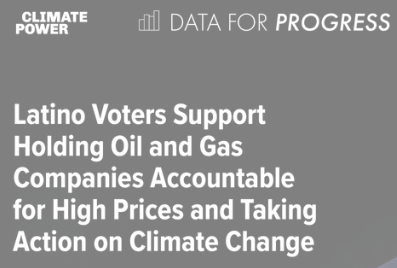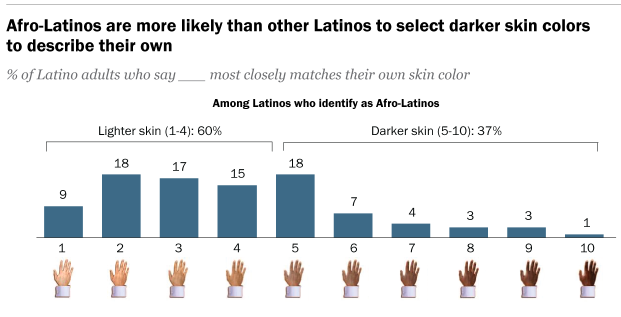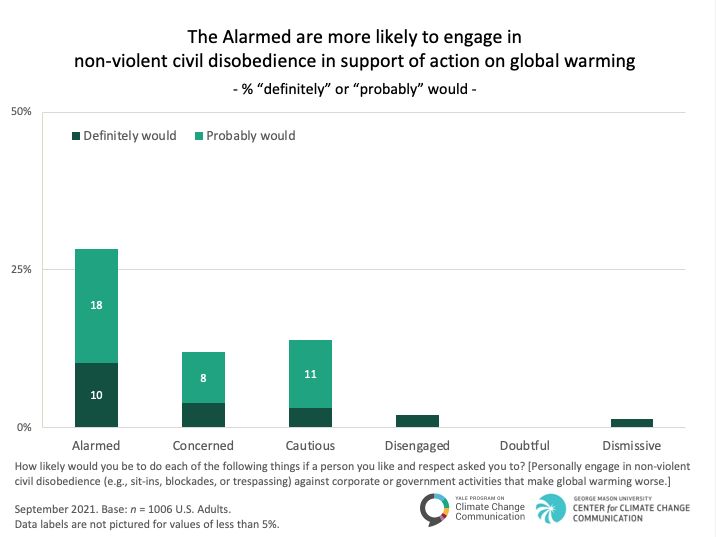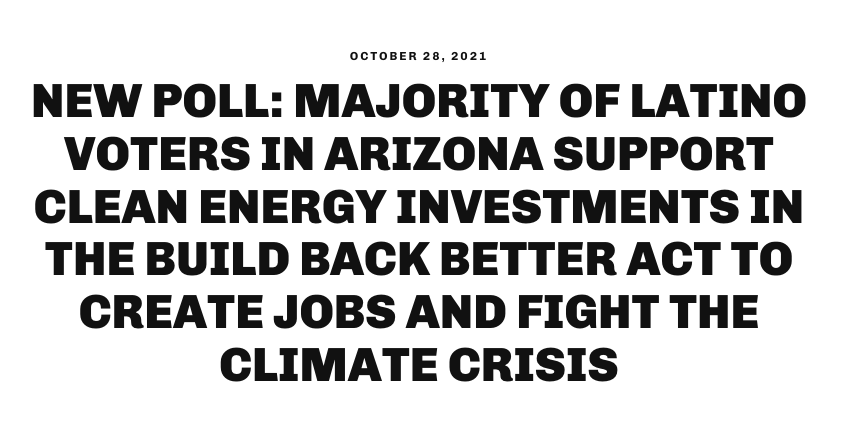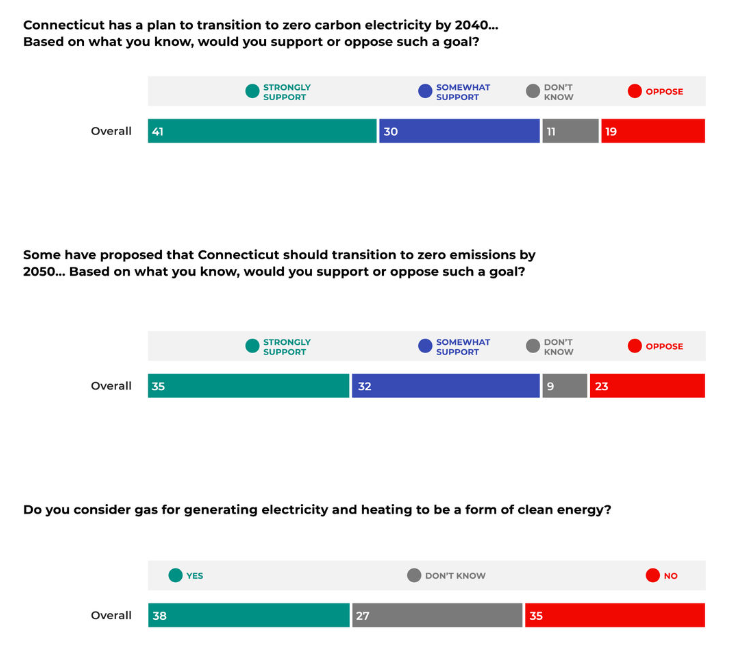Resources
Search below for resources covering the intersection of climate engagement, social science and data analytics.
RESULTS
Poll: Latino Voters Support Holding Oil and Gas Companies Accountable for High Prices and Taking Action on Climate Change
Latino voters are widely supportive of the clean energy transition and see it as an economic positive. Amid the energy crisis, most Latino voters blame oil and gas companies for high gas prices and want to see these companies held accountable. The poll finds that climate change is a major worry for Latino voters: nearly half of Latino voters nationwide (47%) say they are “very concerned” about climate change, including just over half of Latino voters in Florida (51%) and Nevada (51%). Climate Power and Data for Progress also find that, amid the current energy crisis, Latino voters are more likely to blame oil and gas companies for higher energy prices than any other actor. The majority (55%) say that oil and gas companies deserve “a great deal” of blame for higher prices, while 40% blame Vladimir Putin a “great deal” and 36% blame President Biden “a great deal.” And consistent with the blame they put on fossil fuel companies for higher energy prices, there is widespread support among Latino voters for a tax on the excess profits of oil and gas companies (73% support / 21% oppose, with 47% “strongly” supporting the idea).
About 6 million U.S. adults identify as Afro-Latino
In 2020, there were about 6 million Afro-Latino adults in the United States. They made up about 2% of the U.S. adult population and 12% of the adult Latino population. About one-in-seven Afro-Latinos – or an estimated 800,000 adults – do not identify as Hispanic. The life experiences of Afro-Latinos are shaped by race, skin tone and other factors, in ways that differ from other Hispanics. The multiple dimensions of Latino identity reflect the long colonial history of Latin America, during which mixing occurred among indigenous Americans, White Europeans, Asians and enslaved people from Africa.
Environmental Polling Roundup - April 22nd, 2022
This post includes climate and environment headlines, data points, and key takeaways from recent public polls - including new polling on clean energy investment as part of Biden’s economic plan; “direct pay” reforms to better incentivize clean energy production; electric vehicles and ethanol; and state-level polls in California and Massachusetts.
Poll: Who is willing to participate in non-violent civil disobedience for the climate?
A recent survey that asked Americans about their willingness to "support an organization engaging in non-violent civil disobedience against corporate or government activities that make global warming worse" and about their willingness to "personally engage in such non-violent civil disobedience themselves" found:
- Among the Six Americas segments, the Alarmed are the most likely to support an organization engaging in non-violent civil disobedience; half (50%) said they “definitely” (21%) or “probably” (29%) would support such an organization.
- 28% of the Alarmed said they “definitely” (10%) or “probably” (18%) would personally engage in non-violent civil disobedience against corporate or government activities that make global warming worse, if asked to by a person they liked and respected. The ten percent of the Alarmed who are “definitely willing” to personally engage in non-violent civil disobedience represents approximately 8.6 million American adults.
- Millennial and younger adults are more likely to support organizations engaging in non-violent civil disobedience than older generations -- with 35% stating they “definitely would” (14%) or “probably would” (21%) support them -- and also more likely to say they would personally engage in non-violent civil disobedience to protect the climate; 8% said they “definitely would” and 12% said they “probably would,” if asked to by a person they liked and respected.
- People of color are more likely than whites to support organizations engaging in non-violent civil disobedience. About one third (34%) of Black Americans “definitely would” (12%) or “probably would” (22%), and about one third (35%) of Hispanics/Latinos “definitely would” (14%) or “probably would” (21%) support such organizations.
- People of color are also more likely than whites to say they would personally engage in non-violent civil disobedience in defense of the climate; about one in six Hispanics/Latinos (6% “definitely would” and 11% “probably would”) and one in five Black Americans (5% “definitely would” and 17% “probably would”) say they would engage in such actions, if asked to by a person they liked and respected.
Environmental Polling Roundup - January 14th, 2022
This post includes climate and environment headlines, data points, and key takeaways from recent public polls - including new polling about Build Back Better and clean energy incentives, a new poll of Black and Latino Americans about climate and environmental justice issues, new findings from Yale and George Mason’s long-running “Six Americas” tracking study, and a newly released summary of the past year’s polling on climate and environmental issues.
You can also find a press release on the EPC’s end-of-year polling takeaways here, which was put out this week by EDF Action, the League of Conservation Voters, NRDC, Sierra Club, and the Climate Action Campaign.
Environmental Polling Roundup - November 5th, 2021
This post includes a roundup of climate + environment headlines, data points, and key takeaways from this week’s public polls - including fresh polling on the new Build Back Better framework and its core climate and energy provisions + analysis of climate polling trends throughout the year + new polling on attitudes about climate and clean energy among Latino voters in battleground states and districts.
Latino voters in battleground states and districts overwhelmingly support the Build Back Better plan’s climate and clean energy provisions. All of the 11 Build Back Better provisions tested in the poll have overwhelming support (76%+), and several climate and clean energy provisions rank among the most popular elements of the bill whether looking at overall net support or intensity (“strong support”). Particularly appealing provisions include: lowering energy costs by making homes, schools, buildings, and vehicles more energy efficient (89% total support, including 55% strong support); creating millions of additional clean energy jobs in fast-growing industries like wind and solar (87% total support, including 52% strong support); making oil and gas companies pay their fair share for the pollution they create (86% total support, including 55% strong support); providing tax incentives to make clean energy sources like wind and solar power widely available at lower costs (86% total support, including 51% strong support; rewarding electric utilities that generate more electricity from clean energy sources like wind and solar (85% total support, including 50% strong support). (The poll sampled Latino voters statewide in Arizona, Colorado, Florida, and Nevada, as well as Latino voters in competitive U.S. House districts in California and Texas).
Poll Deck: The Changing Public Opinion on Climate Change
This deck from polling firm Global Strategy Group compiles recent public opinion findings on climate and clean energy issues, including the top-testing messaging and language to proactively talk about climate and health, economic impacts, and environmental justice as well as guidance on how to respond to attacks.
(This deck was collected by the Environmental Polling Consortium. If you would like to learn more about the EPC and receive weekly polling insights, please contact epc@partnershipproject.org)
Poll: Connecticut Voters are Ready for Bold Action on Climate and Clean Energy
A poll of 600 registered voters across Connecticut revealed a number of helpful data points about current voter attitudes towards clean energy and fossil fuels including:
Why Intersectional Stories Are Key to Helping the Communities We Serve
Many people communicating for social change are exploring how to tell diverse and inclusive stories that center marginalized communities while building understanding about how inequality persists. Intersectionality is an important tool to help us tell great stories that help us understand systemic issues. Five guiding principles to telling intersectional stories: Show, don’t tell; Provide historical context; Uplift the voices of marginalized people; Tell whole stories; and, Radically reimagine the world.
Pagination
- Previous page
- Page 3
- Next page
